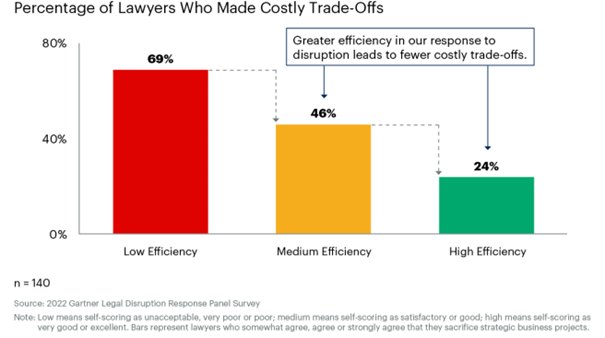Persistent disruption has arisen from macro shocks, such as the ongoing Russian invasion of Ukraine amid other geopolitical tensions, as well as rapid societal shifts in environmental, social and governance (ESG) expectations.
Gartner says corporate legal departments need to build a process for managing and learning from persistent disruption.

“An era of persistent disruption is – and will continue – taxing constrained legal department resources,” said Raashi Rastogi, director of research in the Gartner legal risk & compliance practice.
She suggested that legal leaders need to find efficiencies in how their department handles disruption. They should not anticipate getting a lot more resources to cope, nor should they expect the volume of disruptions to decrease significantly in the near future.
Legal departments typically treat disruption response as high-value urgent work and therefore accept tradeoffs to get it done. However, in the era of persistent disruption, continually making such tradeoffs starts to add up and has a negative effect on the overall departmental workload and efficiency.
A July 2022 survey of 140 general counsels showed the extent to which having an efficient disruption-response process in place reduced the number of costly tradeoffs legal departments had to make (see Figure 1).
Figure 1: Impact of Efficiency on Tradeoffs

“Legal departments that have developed a high-efficiency approach for handling disruptive events are essentially making one tradeoff for every three in a low-efficiency department,” said Rastogi.
“With disruption now being the norm rather than the exception, very few legal departments can afford the volume of tradeoffs that comes with an inefficient response to disruption.” Raashi Rastogi
The most significant costs tend to come in three forms:
Missed business value capture — A response to business disruption is prioritized over matters of long-term strategic importance.
Delayed development of legal department capabilities — Investments in lawyer and business partner training and technology implementation are neglected or delayed.
Lawyer exhaustion and disengagement — Facing more work with the same amount of resources, lawyers are burnt out and leaving, or actively seeking other opportunities.
Learn From Disruption
Departments that prioritize learning from disruption, rather than simply fighting one disruption after another, are far more efficient and provide higher-quality guidance than departments that do not. They’re more effective in helping the business avoid unnecessary risk — risk outside their risk tolerance — while still capturing as much value as possible.
Legal departments that excel in learning from disruption are 3.5 times more likely to be highly efficient in their disruption response and 2.3 times more likely to provide high-quality guidance. Greater efficiency ultimately leads legal to make fewer costly trade-offs in responding to disruption.
“What this means in practice is an ongoing process of learning what actions to take when disruption occurs, and then figuring out how to execute those actions more efficiently,” said Rastogi. “That may involve identifying in advance what the highest-impact disruptions are likely to be, determining how to respond to them, and building the department’s collective experience in executing these responses efficiently.”



